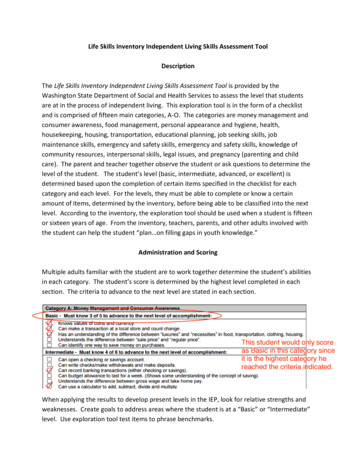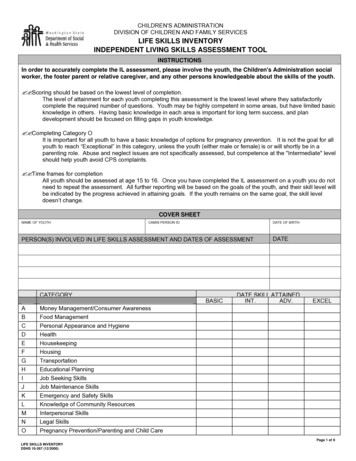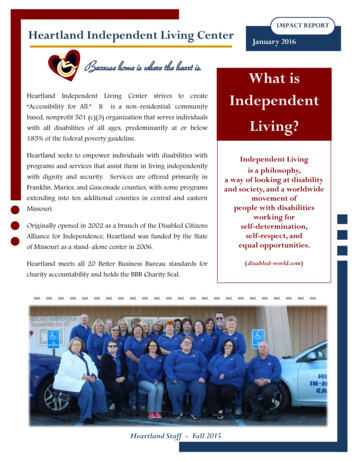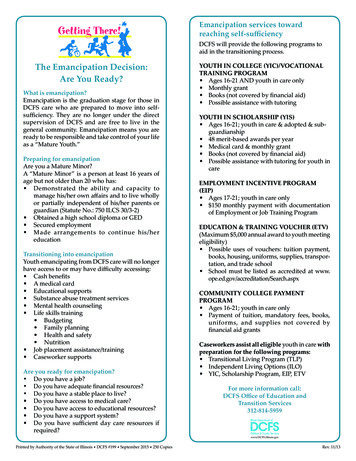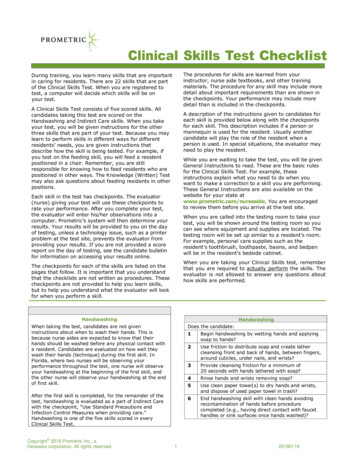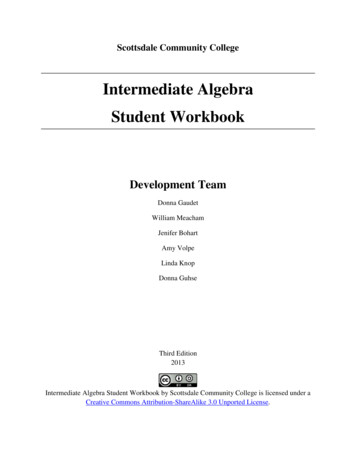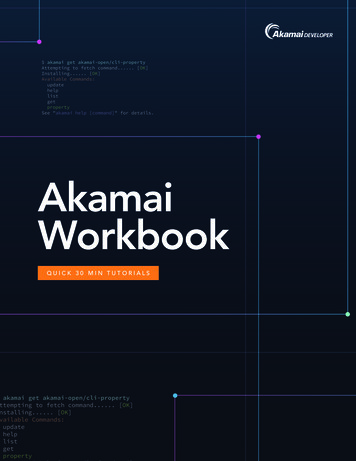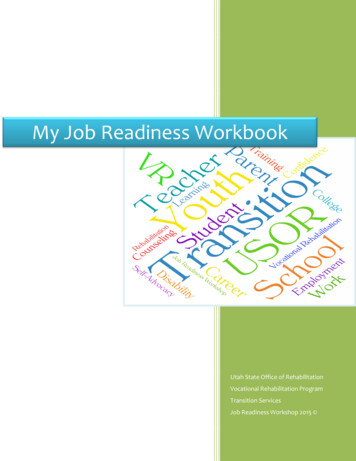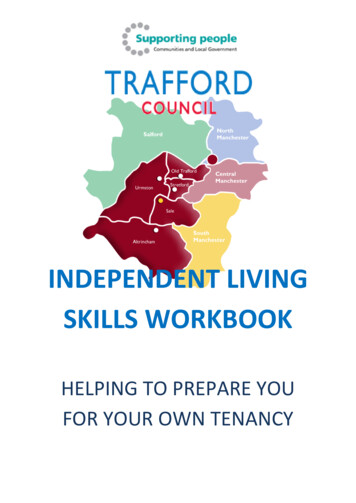
Transcription
INDEPENDENT LIVINGSKILLS WORKBOOKHELPING TO PREPARE YOUFOR YOUR OWN TENANCY
The purpose of this workbook is: To learn how to manage a tenancy and to integrate into yourcommunity. To look at potential risks that might affect your ability tomanage your tenancy and prevent them. To prove to a future landlord that you CAN manage a tenancysuccessfully. To find suitable move on accommodation. To identify organisations/agencies who can offer support if andwhen you need it. To guide you through the move on process. To give you your own booklet of useful information for you totake with you after supported accommodation.Author of this workbook is Janelle Brindle of Adullam Homes HAContact Number: 0161 492 0191.Head Office: 0121 500 2828Head Office Address: Walter Moore House, 34 Dudley Street, West Bromwich. B70 9LS1
ContentsUNIT 1 –Finding a propertyPages 3 – 9UNIT 2 –Rent, Housing Benefit and Council Tax BenefitPages 10 – 13UNIT 3 –Understanding a Tenancy AgreementPages 14 – 22UNIT 4 –Debt, Budgeting and BillsPages 23 – 31UNIT 5 –Being a Good Neighbour and Part of YourCommunityPages 32 -34UNIT 6 –Getting Ready to Move out and Move InPages 35 – 39UNIT 7 –Identifying Ways to Minimise Risks to YourTenancy and Getting the Right SupportPages 40 – 44Final Page: Your Useful Telephone Numbers2
UNIT 1:Finding a propertyThis unit guides you through the process of finding the right move onaccommodation for you.You will need to have a move on plan from the very start because it cantake a long time and there may be obstacles you need to deal withbefore you have a realistic chance of move on such as:Completing application formsPaying former tenant arrearsGetting finance in place for rent / depositPreparing a reference pack for a potential new landlordChecklist for this UNITTickI know about different types of landlordsI have registered with Housing AssociationsI can use Choiced Based LettingsI can use PINPOINTI know where to look for private propertiesI have considered rent and deposit costsI know how and when to bidI have identified any obstacles to my move on and mySupport Plan reflects this.I know how to prepare a reference pack for a landlord(this will need to be added to during your support)Signed (resident) .Signed (staff) . 3Date
Finding a Property For general advice about housing go to the Direct.gov website or speak to staffat HOST.There are a few options for you to look at when you are looking for a newhome.SOCIAL HOUSINGSocial housing is usually the cheapest way of renting. It is property owned bylocal councils or a Registered Social Landlord. Registered Social Landlords aregiven money by the government to help provide affordable housing. (You canfind out which social landlords have properties in Trafford by checking TraffordCouncils website or by going through Housing Options.You can download application forms from websites, apply online or visit one ofthe local area offices.With your worker, find out who is currently managing the Housing Options andHousing Register and put their details here:Name of Service Providerand telephone numberFind your local office addressFind the website address! Put any useful telephone numbers in your ‘directory’ page at the back soyou can find them easily!For SOCIAL HOUSING you have to keep on top of your applications and you willneed to bid for properties through housing and on PINPOINT.When should you bid through housing?When can you bid through PINPONT?4
HOUSING ASSOCIATIONSHousing associations are separate from councils but often work closely withthem to house local people. Most provide a range of housing suited to singlepeople, couples and families. Some also provide housing for people withcertain needs.Once you are registered with a Housing Association partner you willautomatically be registered with pinpoint:Pinpoint has a partnership between 10 local councils in GreaterManchester and 13 housing associations. This gives you a bit more choice andyou can apply to live in a property in Bolton, Manchester, Salford, Bury,Stockport, Trafford, Wigan, Tameside, Oldham or Rochdale. Pinpoint have notelephone number as they are a website. What is the web address?You can also search for properties on Pinpoint. A lot of landlords use Pinpointto advertise their properties. When you log on to Pinpoint you will be askedfor a username and password. Jot them here:UsernamePasswordWith your keyworker, think about good things (pros) and bad things (cons)about SOCIAL HOUSING:ProsCons5
Social Housing in Trafford is advertised on ‘Choice Based Lettings’ on theinternet and in their officesWhere is your nearest Choice BasedLettings office?What is their web address?You can also rentPRIVATEaccommodation:If you wanted to rent from a private landlord and you are on a low income youmay be able to claim and receive Local Housing Allowance. Local HousingAllowance is used to work out how much Housing Benefit you can getdepending on things like your income amount, age and circumstances. It iscalculated depending on where you live and who lives with you. You can checkwhat your allowance might be on the Directgov website by searching for ‘LocalHousing Allowance rates’ through Google and put in your area.Renting a PRIVATE property gives you more flexibility about where you canlive but it will generally be more expensive than renting from the council orsocial landlord.Also, if you rent from a private landlord you may need to pay a deposit beforeyou could move in. A deposit is usually a month’s rent but some landlords areflexible so you should always ask them. Ask your worker where you can go forhelp applying for support getting a deposit together.Like you did before with social housing, now think about good things (pros)and bad things (cons) about PRIVATE RENTING:ProsCons6
TIPS FOR SUCCESSFUL APPLICATIONS BE POLITE: If you are speaking to landlords over the phone – try to haveall the information ready that they might need like your current addressand what kind of property you are looking for. If they ask you anythingyou don’t know, make notes and ask if you can call them back. DRESS SMART: If you go to meet with a landlord face to face it’s good tomake a positive impression. BE ON TIME: Landlords are very busy and they have a lot of peoplewanting to move into their properties. If you are late or missappointments they may withdraw your application or give the propertyto someone else.PRIVATE rented properties are advertised in many places. You can look in localnewspapers, shop windows, local lettings agents and websites such as RightMove.Now answer these questions so you know what you are looking for:How many people will be living in the property?How many bedrooms are you entitled to?How much Local Housing Allowance can you get ifyou rent a private property?Could you get help getting a deposit together?Moving into ANY accommodation you will need good references. The moregood references you have, the better your chances of being successful.Also in your pack for landlords you will need:What you need to takeWhat do you have that you could take?What do you need to get?IDProof of income /benefitsReferencesThink about who you can ask and start getting your pack together.7
Exercise:What does living independently mean to you? (Ask your worker to help you) Have a think about where you have lived before. Was it with friends or family?Have you had your own tenancy before? Have you lived independently?DatesAddressLived with others?Lived Independently?Look back at these places and think about your experience. If you haven’t livedindependently before, try thinking about friends or family who have:List 3 things that went well List 3 things that didn't go well .As you start to apply for properties, think about what a landlord might wantfrom a tenant:WantDon't want8
Applying for Properties When you receive your application forms you may not know what to put. Askfor HELP Speak with staff where you live now Ask the local housing department to help you (HOST) Go to Citizen’s Advice Bureau! Find your local C.A.B. number and address and put it in your directory at theback!You will probably have to fill out quite a few application forms for differentplaces. It might be a good idea to keep a record so you know who you’veapplied to and when you sent the application form in case you need to chasethem up.Name of Landlord and Phone NumberDate SentNotesLooking for property can be really complicated and scary. If you get stuck youcan ring Shelter for advice on anything to do with housing or tenants rights.Free advice helpline:0808 800 4444!! Add this number to your telephone directory at the back !!9
UNIT 2:Rent, Housing Benefit and Council Tax BenefitThis unit gives you some guidance on paying your rent and applying forHousing and Council Tax Benefit.When you get your own place you will be responsible for the rent of thatproperty. If you are on a low income or have no income you can apply forhousing and council tax benefit to help you.The first section looks at addressing FORMER tenant arrears which you mayhave if you have had your own property before as having former tenantarrears may affect your move on.Checklist for this UNITTickI can provide evidence that I have paid rent in my currentaccommodation (if relevant)I can stick to a payment plan (if relevant)I have addressed any former tenant arrears (if relevant)I know how to claim Housing BenefitI know what Council Tax is forI understand what to do if my circumstances changeI know who to contact if I need help when I move into mynew propertySigned (resident) .Signed (staff) . 10Date
RentDo you have previous tenant arrears?If so, how much?Which landlord/s are they with?Have you contacted them to addressthem?Having previous tenant arrears may affect future tenancies. Discuss this withyour worker, if it’s relevant, and incorporate it into your support plan.Your rent is one of the most important costs you have. You need to beresponsible for your rent account and keep up payments on time.Your rent may be split into housing benefit and personal charge / ‘shortfall’.Ask your worker how much your full rent is and how it is split.How much is your full rent?How much does HousingBenefit pay?How much do you pay?Your keyworker or housing officer will help you to track your rent account butYOU need to keep a record of your own account at all times.To practise, keep a record of the first ten weeks here then develop your ownrecord which works for you or use a rent statement.Your current rent account:Week Number12345678910DateAmount Paid11Balance
It is important you keep on top of your rent as you will get a reference fromyour worker for your new property.However, if you fall behind because of circumstances, you will need to agree apayment plan and stick to it.Different landlords have different rules about arrears so you MUST make sureyou know the rules because you may be asked to leave a property if you havenot kept up to date with rent.Note: If you need a payment plan this will be reflected in yoursupport plan and your worker will need to sign off if you have paidyour rent at the end of your stay!Housing BenefitIf you're on a low income, whether you're working or not, and need financialhelp to pay all or part of your rent, you may be able to get Housing Benefit.You will need to claim housing benefit for the accommodation where you livenow. Your worker will help you to claim at Trafford Council Benefits Section.Put their number in your directory at the back.Council TaxCouncil tax is the systemof local taxation which is used to help fund services inyour area such as police, fire, refuse collection, schools, leisure centers, parksand open spaces, street cleaning, public transport, social housing grants,housing and council tax benefits, support for voluntary groups, meals onwheels, facilities for young people, adapting homes for disabled people, playcenters for children, sports facilities and many others.Council Tax BenefitCouncil Tax benefit is paid to people on low income who pay council tax. Youwould claim it at the same time as Housing Benefit from Trafford Council.Change in CircumstancesIf your circumstances change, your benefits or entitlement may change. YouMUST let housing benefit know any changes otherwise you might get anoverpayment and you might end up owing the payment back, leaving you indebt. This can be avoided with a quick phone call to Trafford Council.12
ExerciseWhere do you apply for Housing Benefit and Council Tax benefit? .EXERCISE: See if you can get a blank housing benefit form and ask yourworker to help you go through it.Would you feel confident filling one in on your own? (circle) YESNOYou will need to support your claim with 2 forms of ID (tick if you have them)Birth certificatePassportDriving LicenseBank StatementLetter from solicitor, social worker or doctorRecent gas, electric, water billYou need proof of your National Insurance number (tick if you have them)P45 or P60 (from an employer)Letter from HM Revenue and CustomsNational Insurance cardLetter from Department of Work and Pensions(DWP) eg: JSA letter*NOTE: If there are other people moving in with you, you will also need to provideevidence for them too.You may also be asked for proof of these things. Make notes in the boxes ofdocuments you could take:Proof of rentProof of savingsProof of earnings / incomeWhy might your claim stop? (Give 2 examples). .Where could you get advice if this happens? .13
UNIT 3:Understanding a Tenancy AgreementDuring this unit you will look at different types of Tenancy Agreements, workthrough an example of a Tenancy Agreement and look at your rights andresponsibilities as a tenant as well as the rights and responsibilities of yourlandlord.There are several exercises to complete which will help you to understand atenancy and know what to look for when you go to sign for your ownaccommodation.The unit will give you a better knowledge of rights and responsibilities of bothyou and your landlord so you know how to manage your tenancy and reducethe risks of losing it.Checklist for this UNITTickI understand the basics of different types of tenanciesI have seen what a tenancy agreement looks likeI know how to look for information I need to know in atenancy agreementI know who to speak to if I have any problems with mytenancy agreement or there are things I don’t understandI understand landlord’s rights and responsibilitiesI understand my rights and responsibilities as a tenantI have identified potential risks to my tenancy and theseare reflected in my support planSigned (resident) .Signed (staff) . 14Date
Prepare for Your New TenancyWhen you get your property you will need to understand andsign a tenancy agreement. A tenancy agreement is a legalcontract between landlord and tenant. The agreement containsthe terms and conditions of the tenancy, such as the length of the agreement,the rent payable and what is and isn’t allowed in the property, such as pets.Types of tenancy agreement:Introductory tenancyYou will most likely be offered an Introductory Tenancy, normally lasting 12months, to prove you are a good tenant and that you are a responsible tenantbefore the council offers you a secure tenancy. Your introductory tenancy canbe ended easily if you break the tenancy conditions.Starter tenancies – if you are a new housing association tenantIf you are a new housing association tenant you may be offered a startertenancy – normally lasting 12 months. This is a ‘trial’ tenancy to prove that youare a responsible tenant before you are offered an assured tenancy.Assured tenanciesMost housing association tenants who do not have starter tenancies haveassured tenancies. If you are as assured tenant you have strong rights and canonly be evicted in certain situations. You cannot be evicted unless your housingassociation gets permission from a court. Reasons you can be evicted include ifyou have failed to pay your rent or been involved in anti-social behaviour.If you have been involved in anti-social behaviour your tenancy can also be‘demoted’ which means you have fewer rights and can be evicted more easilyif you continue to misbehave.Assured shorthold tenanciesAssured shorthold tenancies are usually for a set period of time (called a ‘fixedterm’), like six or 12 months. Landlords may use this type of tenancy so it iseasier to get the property back once the tenancy has ended.15
Assured Shorthold Tenancy Agreement(example)under part 1 of the Housing Act 1988as amended under part 3 of the Housing Act 1996.Date: .This agreement is between us . and you . (individually and together):(Please tick appropriate box)The rent is: . Every:Month 4 weeks2 weeks1 weekThe rent must be paid in advance.A1234567891011We let out the property at: (address)to you (individually and together if there is more than one of you) as well as the furniture,fixturesand household belongings that are on the list that you and we signed. The amount of rent isshown on the previous page and both you and we must keep to the terms below.You will have the property and the furniture for .(length of tenancy)From (date) to 11 am on (date)If, at the end of this time, you want to continue the tenancy and you have not already receivedfrom us two months’ notice to end the tenancy, it will carry on from month to month as amonthly contractual tenancy. You must give one month’s notice to end it. This notice must begiven to expire on a rent payment day.This agreement is an assured shorthold tenancy (as defined in section 19A of the HousingAct 1988). The arrangements in section 21 of the Housing Act 1988 for the landlord torepossess the property apply to this agreement. This means that you cannot claim any legalrights to stay on once the tenancy has ended and a court order says you must leave. Thelandlord giving a section 21 notice must give at least two months’ notice, in writing. For moreinformation, you should consult a Housing Advice Centre, solicitor or Citizens’ Advice Bureauwho will tell you what this means.We will let the property to you (individually and together) and only .(tenants name/s)will be allowed to live there.No children are allowed to live in the property without our permission, in writing (which we willnot unreasonably withhold).No animals are allowed in the property without our permission, in writing (which we will notunreasonably withhold).You have to pay a deposit of (you will not receive interest on it).You will get it back when this agreement ends and you leave the property, as long as youhave kept to all the agreements and conditions and you have paid all the rent and bills for theproperty. If you do not do so, we may take from your deposit any rent legally owed to us, orother money legally owed to us, reasonable compensation if you have broken any of youragreements, or the reasonable cost of making good any damage which is not caused by fairwear and tear. We are entitled to keep the deposit until you have produced satisfactory proofthat you have paid for the utility bills (electricity, gas, water and phone) for the property. If youfail to do so, we may pay any charges you owe from your deposit. If we cannot agreeamounts for any breach, the matter will be decided by the County Court.You cannot use the deposit to pay rent under this agreement.If you owe rent or any other money legally payable to us under the agreement, you will haveto pay interest on this amount from the date that it should have been paid. The interest rate is3% above the base rate used by the Royal Bank of Scotland. This rate may apply before, aswell as after, a court judgment has been made against you, depending on the terms of thecourt judgment.We may keep keys to the property.The landlord may remove, store, sell or otherwise dispose of any furniture or goods which thetenant refuses or fails to remove from the property at the end of the tenancy. The tenant shallbe responsible for all reasonable costs which the landlord may incur. The landlord shall beentitled to deduct such costs and any monies lawfully due to the landlord from any moneyrealised from the disposal of such furniture or goods.16
B12345678910111213141516171819C12You must do the following.Pay rent on the days and in the way we have agreed.Pay our reasonable costs for sending reminder letters. These will be for eachreminder.Pay our reasonable costs for any cheque that does not clear. These will be eachtime a cheque does not clear.Keep the inside of the property in at least as good a condition as it was when the tenancystarted (fair wear and tear excepted). Also, at the end of the tenancy you must leave allfurniture and fixtures in the rooms or places they were in at the beginning of the tenancy.Repair any damage that you have done deliberately or that was caused by the neglect orcarelessness of you or anyone else living in or visiting the property. This includes replacingany broken glass in windows and repairing or replacing any damaged fittings andinstallations. If you do not repair the damage you are responsible for, we may give you writtennotice asking you to repair the damage within a reasonable period of time, depending on therepairs that need to be done. If you fail to do this within the period of notice given, we maythen enter the property (after giving you 24 hours’ notice, in writing) and carry out the work you will have to pay us for the reasonable cost of this work.Pay for all electricity, gas and phone bills, water charges and Council Tax relating to theproperty that apply during the period of the tenancy.Take reasonable precautions to prevent frost or similar damage to the property. If the propertyis going to be empty overnight or for more than 12 hours when the weather is likely to be cold,you must leave enough heating on to prevent the water system freezing, or turn off the watersupply at the main stopcock and open all the other water taps and valves in the property todrain the tanks of hot and cold water.Whenever you leave the property unattended, you must lock all the doors and windows andput the burglar alarm on (if any). You should tell us if the property is going to be empty formore than seven days in a row.If you give us notice that you are going to leave the property before this agreement hasended, you must pay our reasonable costs for reletting the property as well as paying the rentuntil a new tenant moves in.Allow us or our agents to come into the property at all reasonable hours of the day to inspectthe condition of the property, to carry out repairs or to do other work which we must carry outby law. We will give you at least 24 hours’ written notice if we are going to enter the property.You must let us enter the property immediately if there is an emergency.Tell us about any repairs or faults that we are responsible for in the structure or outside of theproperty, in any installation or in the shared areas.Only park vehicles on your parking space and without causing an obstruction.Pay the reasonable costs for replacing locks if you fail to return any key.Pay any reasonable cost for getting replacement keys.Allow possible new tenants and prospective purchasers to look at the property on at least 24hours’ written notice during the last month of the tenancy.Be jointly and individually responsible for paying all the rent you have to pay under thisagreement and keep to all the terms of this agreement.Defrost the fridge when necessary. You will be responsible for the reasonable cost of makinggood any damage that is caused because you have not done this.Be responsible for looking after the garden. It must be kept tidy and properly cultivated withany grass cut regularly, but you do not have to improve the garden.At the end of the tenancy, leave the property and our fixtures and fittings in as good acondition as at the start of the tenancy (fair wear and tear excepted) and free from rubbish.You must not do the following.Alter or add anything to the outside or structure of the property, or the furniture, fixtures andhousehold belongings that are on the list that you and we signed. You must not bring into theproperty any furniture, fixtures or household belongings which do not meet the Furniture andFurnishings (Fire) (Safety) Regulations. You can get information about these regulations fromyour local Trading Standards Office.Anything which may be a nuisance or annoy neighbours. You must not play any radio, CD,record player, television or musical instrument in a way that will cause a nuisance, annoy theneighbours or be heard outside your home between 11 pm and 7.30 am.17
3456789101112131415Bring bicycles, motor cycles, and prams into the property without our permission, in writing(which we will not unreasonably withhold).Bring any furniture into the house without our permission, in writing (which we will notunreasonably withhold).Tamper with any fire precautions.Hang pictures or posters on the walls without our permission, in writing (which we will notunreasonably withhold).Use Blu-tack or any similar type of adhesive on the walls.Sublet the property or any part of it, or give up the property or any part of it to someone else.Transfer the tenancy to someone else without our permission, in writing (which we will notunreasonably withhold).Carry on any profession, trade or business in the property.Display any permanent notice on the property.Use the property as anything other than a home.Block, or allow guests to obstruct, any of the shared areas.Dry washing inside the property, except in a ventilated room suitable for such purposes.Use any paraffin or portable gas heater.D1We agree to do the following.Keep the property insured against fire and other usual comprehensive risks as long asinsurancecover is available.2Let you have free access to the steps, entrance hall, stairs and all shared areas and keepthoseareas clean, light and in good condition.3Be responsible for servicing and maintaining any gas heating system and making sure that allgasappliances within the property are checked by a British Gas or Corgi-registered technicianevery year, in line with the Gas Safety (Installation and Use) Regulations 1994.4Be responsible for making sure that any furniture we provide keeps to the Furniture andFurnishings (Fire) (Safety) Regulations.5Give you back any part of the rent that you have paid for any period that the property couldnot be lived in because of fire or any other danger that we are insured for.6Keep the structure and outside of the property in good repair.7Keep the gas, water, electricity, space-heating and water-heating installations in good repairand proper working order.If we need to serve any notice on you, we will deliver it by hand or send it to you by first-class post totheproperty address. This means that notices are served on you once they are put through yourletterbox, even if you do not receive them because you have moved. If you give us another address tosendnotices to, any notice will be validly served at that address, if it is posted by first-class post or leftat that address.If you need to serve any notice on us, they must be delivered by hand or sent by post to thefollowingaddress. .We may repossess the property if: you fail to pay us rent 14 days after it is due, whether you have been asked for it or not; you (or any of you) become bankrupt; any of the grounds listed in Schedule 2 of the Housing Act 1988 as amended under the HousingAct 1996 apply (these include not paying rent, breaking the tenancy term and causing a nuisanceor annoyance); or the arrangements for us to repossess the property in section 21 of the Housing Act 1988 apply.We need a court order to repossess the property. You should contact a solicitor, Citizens’ AdviceBureau or Legal Advice Centre who will tell you what this means.Our signature:Your signature(or signatures):Witness's signature:Name:Address:Occupation:18
Now see if you can answer these questions about the tenancyagreement 1.) Look on the first page of the agreement. Will you have to pay rent before youmove in? .2.) You would likely find that the initial tenancy was for 6 months. In section A2how much notice would your landlord have to give you if he/she wanted toend the tenancy after that period? . .3.) How much notice would you have to give? . .4.) According to section A6 are you going to be able to have a pet? . .5.) According to A11, in your own words, what can the landlord do if you leaveanything behind when you move out? .6.) According to B5, in your own words, what should you do if you accidentlybreak a window? .7.) Looking at B5 again and B10, what should the landlord do if he/she wants toenter your property? . .8.) According to C1 and C4, can you bring your own furniture into the property? . .9.) Looking at B4, B7, D2, D3 and D7 what generally is the landlord responsible forand what is the tenant responsible for?
INDEPENDENT LIVING SKILLS WORKBOOK HELPING TO PREPARE YOU FOR YOUR OWN TENANCY . 1 The purpose of this workbook is: To learn how to manage a tenancy and to integrate into your community. To
